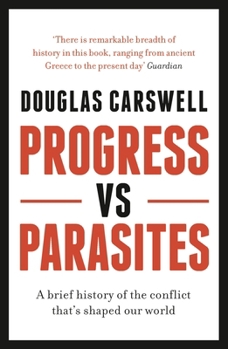Progress Vs Parasites: A Brief History of the Conflict That's Shaped Our World
Select Format
Select Condition 
Book Overview
The change in our ancestors' behaviour was barely perceptible at first. Only a few clues in the archaeological record - sea shells, ochre and stone tools exchanged over long distances - hint at what was to come. Today, a network of interdependence and trade spans the planet - lifting most of our species out of the grinding poverty of the past.
But for much of history this engine of human progress stalled, with societies rigged in the interests of small parasitic elites. From the Greeks and Romans in antiquity, to China, India and Europe in the Middle Ages, the history of the world can be written as the constant struggle between the productive and the parasitic. Progress Vs Parasites charts this struggle. States rise and empires fall as the balance between the two shifts. It is the idea of freedom, Carswell argues, that ultimately allows the productive to escape the parasitic - and thus decides whether a society flourishes or flounders. A robust defence of classical liberalism, Progress Vs Parasites shows that the greatest threat to human progress today - as it has been in every age - is the idea that human affairs need to be ordered by top down design.Format:Paperback
Language:English
ISBN:1786691566
ISBN13:9781786691569
Release Date:August 2019
Publisher:Head of Zeus
Length:384 Pages
Weight:0.60 lbs.
Dimensions:0.9" x 5.1" x 7.7"
Customer Reviews
0 rating





